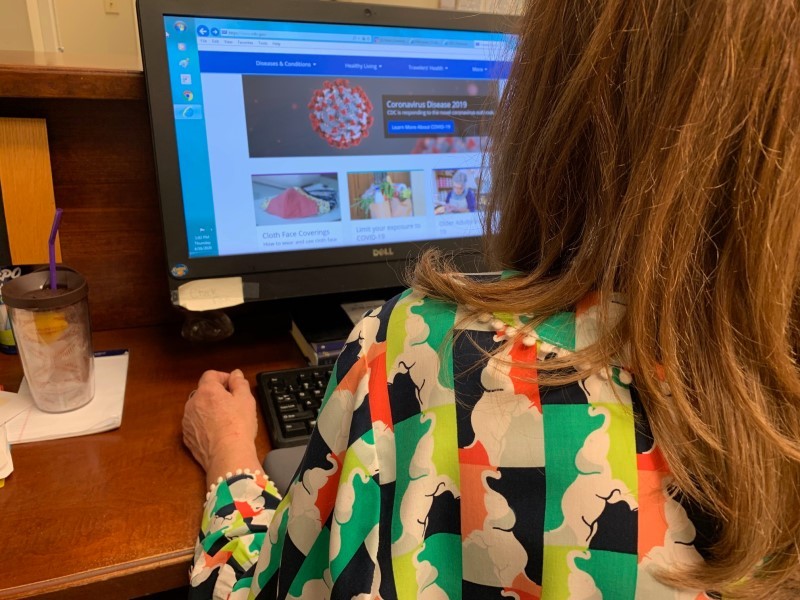For two weeks now, the state of Georgia has been under a shelter-in-place order to contain COVID-19 and the order will keep Georgians at home - for the most part - until at least the end of the month. The isolation and uncertainty that has come along with the state order and other measures designed to curb the illness has created a growing atmosphere of anxiety, according to local mental health professionals.
Dr. Devin Vicknair, a licensed professional counselor with Northeast Georgia Physicians Group, said in a recent interview that he has seen anxiety even among those who don't typically suffer from such tensions.
"It's all very surreal for most of us, almost like it's something out of a sci-fi movie," Vicknair said.
He pointed to a study by Stanford University professor and scientist Robert Sapolsky who found that anxiety and stress are typically created by five factors - lack of predictive information, lack of a sense of control, social isolation, the sense that the situation is growing worse and not having an positive outlet to displace the anxious feelings. Vicknair said all of those factors are present with the coronavirus pandemic, and he said there's no "one-size-fits-all" answer to overcoming the anxiety.
Vicknair said to ward off anxiety, people need to take care of themselves physically, socially and psychologically.
"Practicing things that increase our happiness, that give us purpose and meaning or even taking some time to do some additional learning, reading that book we haven't read [will help]," Vicknair said. "We [also] have to be aware of our environment. This is an opportunity to open the blinds, let the light in, maybe even clean a room or paint the walls, organize things as opposed to letting things get disorganized because that's how our brain looks if our environment is like that."
Vicknair said this is also a good time to do a spiritual assessment to keep the anxiety at bay.
"Spirituality means different things for different people, but it's something bigger or greater than us," Vicknair said. "Part of our spirituality is checking our purpose. Whenever we go through something big like this, it gives us an opportunity to evaluate and that evaluation can be really great for our growth."
Vicknair likened the pandemic experience a grieving process, and Dr. Simon Cordery, a licensed psychologist who is the Director of the Student Counseling Center at the University of North Georgia, has a similar take.
He has been counseling college students who have had to transition from their campus life to a complete online learning experience, and he said many of those students are grieving the loss of their college experience.
"There's lots of anxiety going on among students right now," Cordery said, noting that they are worried about their physical health, their grades and the economy. He said the group displaying the highest level of stress at this time is soon-to-be graduates.
"First of all, I validate that this is extremely anxiety-provoking and uncomfortable for them...but then moving forward, I try to get them to just take one step at a time, try to stay in the moment, try to stay out of their head so much about the future," Cordery said. "That's my advice to them...make the best decision they can at the time with the information they have available."
In fact, Cordery said his advice to students holds true for most anyone who finds themselves overwhelmed with the coronavirus crisis.
"Remember that this is temporary, that things are going to get better [so] try to get a routine into your working life," Cordery said. He also suggested keeping tabs on physical health while the shelter-in-place order is in effect, cutting back on snacking and exercising when possible.
The Student Counseling Center produced a short video to give students some coping mechanisms during the last weeks of school. [The video accompanies this story.]
Both Cordery and Vicknair advised limiting social media and news coverage during the pandemic, since the constant information can be overwhelming. Both men also suggested keeping in touch with friends and family, even if you can't visit up close, because cultivating relationships is vital for mental health and well-being.
If you're feeling anxious or stressed during the pandemic, the State of Georgia has established a toll free support line, which is operational 24/7.
Georgia COVID-19 Emotional Support Line
866-399-8938
Operating in partnership with The Georgia Department of Behavioral Health & Developmental Disabilities, Beacon Health Options and Behavioral Health Link

http://accesswdun.com/article/2020/4/895768/area-psychologists-say-acknowledging-the-stress-of-coronavirus-environment-is-the-first-step-to-coping
